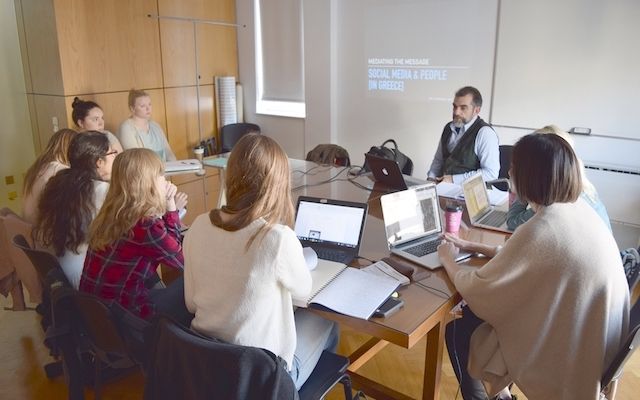
Urging students to go back to the future
By DEMETRIS KAMARAS*
Revisiting and constant deconstruction of old theories through the digital prism is one of the students’ favorites. They are ready to jump from their friends’ funny comments on Facebook to the latest incidence in mainstream politics.
Capturing the attention span of millennials is quite a task. Especially when you embark on a structured attempt to provoke their thinking as regards social networks, i.e. students’ way of life.
Therefore, the various ways messages are mediated via traditional and digital media in Greece is a field that matches their turf, their everyday living, amidst a huge amount of information, numerous teasers originating from official and friendlier sources, about things they really care, or are ready to ridicule.
At the same time, the world of social networks (or personal media) is a matter of scientific exploration, digging in the theoretical structure of communications that is now put under complete revision. The revisiting and constant deconstruction of old theories through the digital prism is one of the students’ favorites. They are ready to jump from their friends’ funny comments on Facebook to the latest incidence in mainstream politics.
Millennials are like this. They have a short attention span but they are ready to meaningfully question traditional stereotypes and theoretical perspectives that do not ‘fit well’. Besides, they are the indigenous of the digital revolution, viewing the previous generation as the digital migrants who are trying to adapt. And they are right!
In the academic version of social networks and their effects on journalism, newsmaking and content management at large, the feedback from youngsters is equally useful as the lecture material. The synthesis of multidisciplinary research (designed to compete with the short attention span and the insight of the new generation) with generic action and reaction is what forms the educational experience.
Besides, we are just here to offer them the tools to explore themselves and acquaint them with the industry to explore the practices, the campaigns and the spinning of messages. Naturally, in their encounters with communication executives in politics and communication agencies, the professionals appear equally eager to draw some first hand experience from our students too. At that particular moment, brainstorming is at its best!
* Demetris Kamaras is a journalism professor and journalist, primarily online. Political analyst and communications specialist. Previous studies in economics (BA), communications policy (MA) and journalism (PhD), mostly in London. Born in Hove, Brighton. Lives in Athens, Greece. Blogs when necessary. Founded and runs dailyGreece.net (Private Information Network), EmbassyNews.net and alyunaniya.com (Greece). Occasional articles of friends are published on PostNews.eu. Interested in political communication, next-gen web apps, digital R&D, internet ethics and social networks. He taught journalism and communication at University of Indianapolis Athens (1999-2013). Published numerous analyses and op-eds, online and in print and his first book was titled: Digital Communication (Zenon Publications, London, 2000 – co-authorship). Recent publications: Crisis Talk: Greece (2012, iBook); Elections and the Internet, Digerati Publications (Athens, 2014); Crisis Talk: Greece part2 (2015, iBook). [dKamaras.com]





